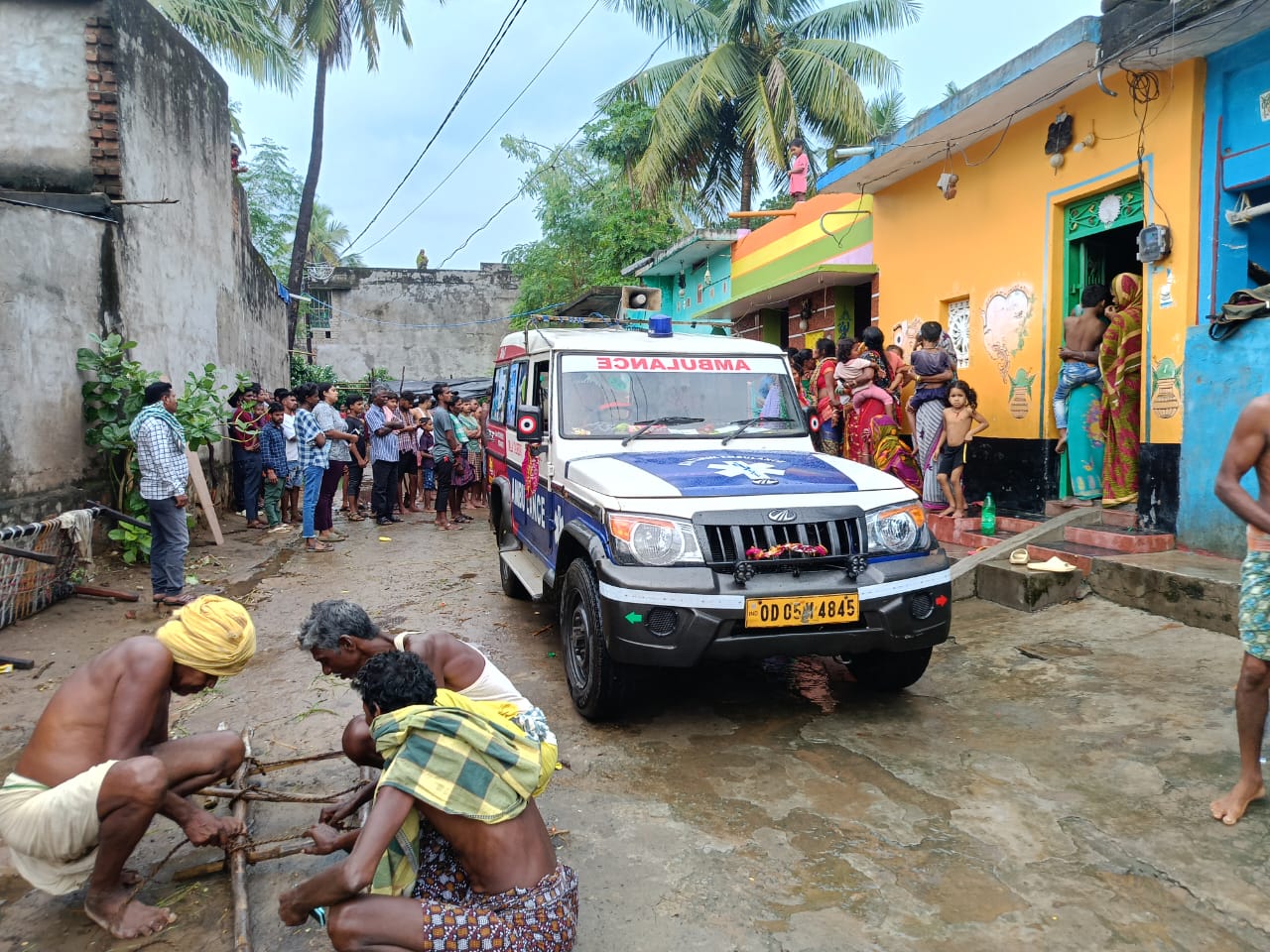Ensuring dignity beyond life: supporting migrant families in their darkest hours
StoryBy Joel Jose
3 March 2025
Gram Vikas, in partnership with Centre for Migration and Inclusive Development (CMID), ensures dignified repatriation of deceased migrant workers, easing financial burdens on families and advocating for safe migration, social security, and workers' rights across Odisha and Kerala.

The dead body of a migrant worker arrived home from Kerala.
Photograph shared by Prashant Gouda
Dillip Kumar Jena, aged 39, a resident of Nayapatna village, Kasanda Gram Panchayat, Bolagada block, Khorda district, worked in Kerala. Tragically, his body was discovered at a railway station under the jurisdiction of Mangalapuram police in Trivandrum on November 6, 2024.
Since the family members were unable to go to Kerala, releasing the body posed another challenge. With nobody to take ownership of, the body remained in mortuary for seven days. After seven days without any progress, the Assistant Labour Officer of Khorda sought Gram Vikas’ help.
Gram Vikas supported the family members to approach the local police station and issue authorization to CMID enabling their representatives to receive the body and proceed with repatriation procedures. Dillip’s family could not afford the cost of transporting his remains. On November 15, 2024, through a collaborative effort with CMID, Dillip’s body was finally brought back to his village. The District Labour Office (DLO), Khorda, covered the entire ₹30,000 cost of transportation.
Migrant workers are drawn to Kerala and other southern states because of the job prospects these states offer, which makes these states more promising. There is a high demand for labour in the industrial sector in states like Kerala and Karnataka.
For most migrant workers who travel to Kerala from Odisha, the attraction lies in better wages and a more inclusive social environment. Extreme poverty, high illiteracy rates, and climate extremes that have reduced farming incomes have driven these men to migrate from the villages with the prospect of earning better wages. Livelihood opportunities in the village are scarce, as farming produces low yields and minimal income. Unpredictable rainfall, pest infestations, and widespread crop damage have made farming increasingly challenging.
These workers at the destination sites often endure precarious working and living conditions, making them more vulnerable to accidents, illnesses, and even untimely death. When tragedies occur, families face not only the emotional trauma of loss but also the financial burden of repatriating their loved ones’ remains. Many cannot afford the high transportation costs, nor do they have the legal documentation required to claim a death certificate. Without this certificate, the family faces legal hurdles in securing social security benefits or even formally registering their loved one’s passing.
Safe migration must ensure occupational safety, decent housing access, quality healthcare for workers, and dignified after-death support.
Since 2019, in partnership with CMID in Kerala, Gram Vikas has championed a corridor approach to migration, advocating for workers’ rights and safety. This commitment extends beyond life itself, ensuring that those who pass away far from home receive the respect and dignity they deserve in death.
Gram Vikas and CMID help bridge this gap by immediately assisting bereaved families. In 2024 alone, Gram Vikas and CMID supported 35 cases of migrant worker deaths, raising over ₹11 lakhs through contributions from employers, government departments, and crowdfunding efforts.
One such case was that of Tiki Naik, a 40-year-old construction worker from Tuludi village in Ganjam district. On November 17, 2024, Tiki passed away while working at a site in Tamil Nadu. As the sole breadwinner, he left behind his pregnant wife, Sunita, and their two-year-old daughter. Facing immense distress, Sunita turned to Gram Vikas for support.
Working alongside the DLO Berhampur and Tiki’s employer, Gram Vikas facilitated the transportation of his body—first by train from Chennai to Berhampur and then by ambulance to Tuludi village. The ₹32,000 cost was shared between the employer (₹25,000) and the DLO (₹7,000). This collaborative effort ensured that Tiki received a dignified farewell and his grieving family found closure.
Beyond repatriation, Gram Vikas also assisted Sunita in accessing crucial social security schemes. She was enrolled in the Public Distribution System (PDS) for ration benefits and secured support through the widow pension scheme and the National Family Benefit Scheme (NFBS). While the loss remains profound, these interventions offer her a foundation to rebuild her life.
Dilip and Tiki lacked labour cards or insurance coverage—an unfortunate reality for many migrant workers who remain wary of such schemes. However, these provisions could have significantly benefited their families, offering access to medical care, educational support, and financial security.
These stories highlight the urgent need to prioritise the safety, dignity, and well-being of migrant workers—not just in life but even in death. Gram Vikas is working closely with district labour commissions across Odisha to raise awareness about safe migration practices and social security entitlements, ensuring no family is left helpless in their darkest hour.
The body being handed over to migrant families with respect and dignity.
Photograph shared by Prashant Gouda
ACKNOWLEDGEMENT
Joel Jose supported data collection. Priya Pillai edited the story.
ABOUT THE AUTHOR
Joel Jose is a Junior Manager in Gram Vikas’ Safe and Dignified Migration Programme.
RELATED BLOGPOSTS
Turning losses into gains: How Mallipanka farmers find success in new crops
Reviving agriculture: Mallipanka’s first strawberry farm story.
Collective leadership transforms ageing overhead water tank to secure household water supply for all
Kalakhadi’s aging overhead tank revived through collective leadership, ensuring sustainable water supply for the community.
Climate resilient farming initiative boosts local farmer incomes in Balangir
Exposure to sustainable and resilient farming practices helps small farmers reap success in pointed gourd cultivation.